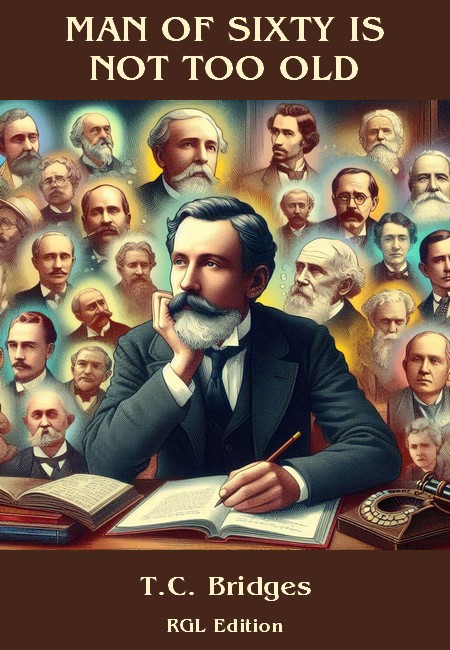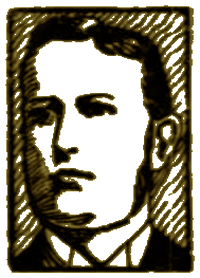
RGL e-Book Cover
Based on an image created with Microsoft Bing software
Roy Glashan's Library
Non sibi sed omnibus
Go to Home Page
This work is out of copyright in countries with a copyright
period of 70 years or less, after the year of the author's death.
If it is under copyright in your country of residence,
do not download or redistribute this file.
Original content added by RGL (e.g., introductions, notes,
RGL covers) is proprietary and protected by copyright.

RGL e-Book Cover
Based on an image created with Microsoft Bing software



HIS is the day of the young man. For years past this statement has been dinned in our ears, until most of us have accepted it as a fact. Venture a feeble protest, a score of examples are hurled at your devoted head. Kipling, Marconi, the Kaiser, even Winston Churchill are quoted. Authors, artists, actors, inventors, soldiers, statesmen of under forty are pointed out as brilliant examples of the great truth that the world to-day is run by young men. You are told that so great is the rush and pressure of modern life that a man who has entered the arena in early youth must be old at fifty.
Whose brain is it that has humbled the might of Russia and won an empire for the island kingdom of the East? The whole scheme of this amazing war was hatched in the brain of Marshal Oyama, and it would be rash to say that there is a man alive of under sixty who could carry in his head the threads of so many and so complicated schemes as does this white-haired, silent Japanese.
Who is the greatest scientist alive? I suppose that there is no one who would suggest any other answer to this question than the one name, Edison. He is fifty-eight, and patents on an average thirty new inventions a year. Does any one imagine that his activity will cease in two years' time? On the other side of the Atlantic by far the greatest star in the scientific horizon is Lord Kelvin, eighty-one this year. The best and greatest work of his life has been done within the last twenty years. Three at least of his greatest inventions in the way of electrical measuring machines have been achieved since he passed the sixty post. Only a couple of years ago he was conducting a series of most delicate and interesting experiments in connection with the rotation of the earth, illustrating them before his pupils with a boy's spinning top. Not long ago he was lecturing on the tensile strength of various metals. To illustrate his figures he slung a fifty-six pound cannon ball from the roof by a thin steel wire.
"Now," said he, "to prove that my calculations are accurate. I will stand beneath that ball for the rest of the hour." And he did,
Turn to the world of business and see who holds premier place. Undoubtedly the greatest financier alive is Pierpont Morgan. He has practical control over properties capitalized at more than six billions of dollars, an amount far greater than the combined annual revenue of the forty three principal nations of the world. Six feet high, weighing 230 pounds, he is straight, strong, and powerful, and looks ten years younger than his sixty-eight years. To see him jump out of a cab, run into his office, devour the contents of a lengthy document in fifteen seconds, by no stretch of imagination you could consider the amazing man as beyond work.
Andrew Carnegie again. The same ago as Morgan and every bit as rigorous, even though he has retired from active business. Just begun to enjoy life, so he says. He golfs, motors, rides, and attends to more business in his private house than most men do in their offices. Only the other day he was delivering a lecture on the "Mysteries of Steel" at a meeting of the Iron and Steel Institute. Surely he constitutes a living argument against every man over sixty bring condemned to a bath chair of a lethal chamber.
I could multiply such instances by the score. Russell Sage at eighty nine is active as ever in the pursuit of millions. John D. Rockefeller, in spite of bad health, manages the largest private fortune and public company at sixty-six. H. M. Flagler of Standard Oil and Florida Hotel fame, is seventy-five. Charles T. Yerkes again was the same age as Morgan and Carnegie. He was fully sixty when he went over to England and began to confer upon benighted London the inestimable benefit of electric traction on the sulphurous underground, and incidentally to make a brand new and enormous fortune for himself.
Lord Roberts was sixty-eight when he took command of the British forces in South Africa and began those operations which brought the war to a successful conclusion. How about the English "Jacky" Fisher? Does anyone feel inclined to call that apostle of efficiency too old to recommend him to retire to private life and to make way for younger men?
Pass to the stage. Sir Charles Wyndham had recently to undergo a slight operation. "Go ahead," he said. "I know all about it. I was a doctor myself once." So he was. More than forty years ago he acted as army surgeon during the great civil war. Yet, in spite of his more than sixty years, could any one seeing him either on or off the stage call him old? It would be impossible. The stage is the most trying of all the professions and is said to age its votaries the most rapidly, yet not only Wyndham but many other veterans are proof of players over sixty who can still more than hold their own with any of the younger generation.
Whisper it! Ellen Terry will be sixty in three years. Is she an old woman? And how about Mme. Patti, who is sixty two?
Turn to the knights of the pen. Here, above all other professions, the genius of youth is supposed to shine preeminent. The common idea is that an author is written out at thirty. May I suggest to such as share this belief a perusal of the recent works of Count Tolstoi, who has passed not only three score but four score years. Not only is he the greatest writer and leader of thought in his own country, but his influence is so great that the omnipotent bureaucracy is actually afraid of him.

Any other man who had written or spoken half as strongly against the powers that be would have long ago made acquaintances with the dungeons of the great fortress of Peter and Paul. More than this, Tolstoi. though now becoming feeble, up to five years ago, worked in fields with his laborers, cutting hay and plowing. There is a sketch by the Russian artist Pasternak representing the white-haired patriarch energetically engaged in the former occupation.
Clark Russell, again, has passed his sixtieth birthday, yet, despite physical ill-health, is mentally as active as ever. Lying on his sofa in his house at Bath, he dictates his glowing word pictures of sea and sky and storm.
The great sea writer was at school in France with three of Charles Dickens' sons.
When young, Marcus Stone illustrated books for Thackeray, Trollope, and other giants of the middle of the nineteenth century. He is still to the fore in spite of sixty-five years and as great a "dramatist in color" as ever. Half of the great artists of to-day are men well on in years, and it is a generally accepted fact that few painters achieve the height of their fame before middle age.
Roy Glashan's Library
Non sibi sed omnibus
Go to Home Page
This work is out of copyright in countries with a copyright
period of 70 years or less, after the year of the author's death.
If it is under copyright in your country of residence,
do not download or redistribute this file.
Original content added by RGL (e.g., introductions, notes,
RGL covers) is proprietary and protected by copyright.